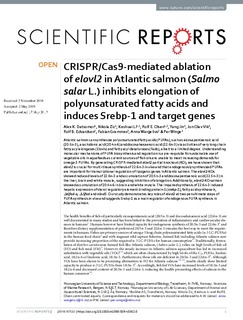CRISPR/Cas9-mediated ablation of elovl2 in Atlantic salmon (Salmo salar L.) inhibits elongation of polyunsaturated fatty acids and induces Srebp-1 and target genes
Winge, Per; Datsomor, Alex; Olsen, Rolf Erik; Jin, Yang; Vik, Jon Olav; Edvardsen, Rolf; Grammes, Fabian; Wargelius, Anna; Li, Keshuai
Journal article, Peer reviewed
Published version

Åpne
Permanent lenke
http://hdl.handle.net/11250/2600059Utgivelsesdato
2019Metadata
Vis full innførselSamlinger
- Institutt for biologi [2565]
- Publikasjoner fra CRIStin - NTNU [37963]
Sammendrag
Atlantic salmon can synthesize polyunsaturated fatty acids (PUFAs), such as eicosapentaenoic acid (20:5n-3), arachidonic acid (20:4n-6) and docosahexaenoic acid (22:6n-3) via activities of very long chain fatty acyl elongases (Elovls) and fatty acyl desaturases (Fads), albeit to a limited degree. Understanding molecular mechanisms of PUFA biosynthesis and regulation is a pre-requisite for sustainable use of vegetable oils in aquafeeds as current sources of fish oils are unable to meet increasing demands for omega-3 PUFAs. By generating CRISPR-mediated elovl2 partial knockout (KO), we have shown that elovl2 is crucial for multi-tissue synthesis of 22:6n-3 in vivo and that endogenously synthesized PUFAs are important for transcriptional regulation of lipogenic genes in Atlantic salmon. The elovl2-KOs showed reduced levels of 22:6n-3 and accumulation of 20:5n-3 and docosapentaenoic acid (22:5n-3) in the liver, brain and white muscle, suggesting inhibition of elongation. Additionally, elovl2-KO salmon showed accumulation of 20:4n-6 in brain and white muscle. The impaired synthesis of 22:6n-3 induced hepatic expression of sterol regulatory element binding protein-1 (srebp-1), fatty acid synthase-b, Δ6fad-a, Δ5fad and elovl5. Our study demonstrates key roles of elovl2 at two penultimate steps of PUFA synthesis in vivo and suggests Srebp-1 as a main regulator of endogenous PUFA synthesis in Atlantic salmon.
